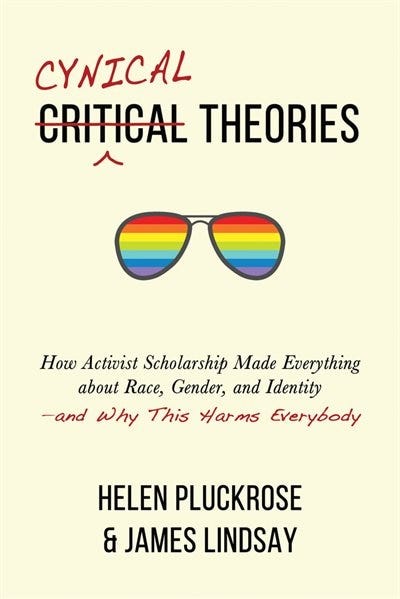Cynical Theories: How Activist Scholarship Made Everything about Race, Gender, and Identity – and Why this Harms Everybody, by Helen Pluckrose and James Lindsay. Narrated by Helen Pluckrose. Pitchstone Publishing, 2020. 10 hours (approx.).
Cynical Theories by Helen Pluckrose and James Lindsay is a difficult read but an important one. While it is hard to understand postmodernism, it is crucial that we do understand it and its influence on today’s “Social Justice scholarship.”
Helen Pluckrose and James Lindsay first came to my attention through the “grievance studies affair,” which was a project by the authors, along with philosophy professor Peter Boghossian, to shine a light on the deteriorating standards of certain academic journals. They wrote bogus research papers and submitted them for peer review. That four of these papers were published, three were accepted and seven others were being considered shows the state of decay academics is in. The published papers were retracted after the hoax had been discovered, but the point is they should not have been published in the first place.
Pluckrose argued that academic journals publishing suspect material is due to the influence of postmodernism. She and Lindsay further explore this idea in the book we are here to discuss.
They claim postmodernism has evolved through three phases.
The “high deconstructive” phase is characterized by 1). “a radical skepticism about whether objective knowledge or truth is obtainable and a commitment to cultural constructivism,” and 2). “a belief that society is formed of systems of power and hierarchies, which decide what can be known and how.” In this form it playfully and ironically criticized and subverted knowledge, ways of knowing, hierarchy and power. But it was too cynical and nihilistic to be of any practical use and its endless deconstruction eventually burned the movement out.
The “applied postmodernism” phase attempted to make postmodernism actionable, to give it a purpose, a goal. To that end it asserted two truth claims: that identity is real and so, too, is the use of power to oppress certain identity groups. The new wave of scholars turned their attention to dismantling these systems of power, which they saw as the core problem of society. This enabled applied postmodernists to adopted an activist role. They hijacked the ideas of the civil rights movement and would create an illiberal ideology later known as “Social Justice.”
The third phase marks the branching out of postmodernism into Critical Theories such as postcolonial theory, queer theory, critical race theory, intersectional feminism, gender studies and disability and fat studies. The authors spend chapters three through seven explaining how each of these Theories evolved out of the “applied postmodernism” phase. They end by advocating for liberalism and offering example statements of opposition.
Theory seeks to change knowledge and topple power structures by changing the ways we talk about things. Hence, the aggressive enforcement of political correctness in the 90s and again in the 2010s. It also gave rise to “research justice.” The authors write, “empirical research that values knowledge production rooted in evidence and reasoned arguments is an unfairly privileged cultural construct of white westerners. It is therefore, in this view, a moral obligation to share the prestige of rigorous research with other forms of research including superstitions, spiritual beliefs, cultural traditions and beliefs, identity-based experiences and emotional responses.” It is no wonder academic journals are publishing bogus papers.
Pluckrose and Lindsay state from the outset this book is intended for the layperson. On that point they fell short. They gave it a great shot, but postmodernism is a convoluted subject, and it may take more than one reading to comprehend it. Nevertheless, I recommend Cynical Theories even if you have to read it twice. It is vital we understand this ideology. Not only is postmodern-derived scholarship rotting the universities as we have seen through the grievance studies affair, but it is metastasizing into every aspect of life including politics, activism, churches and corporations.
[I’d like to thank my friends for helping me with this review. It was the hardest one I have ever written. But if I made any mistakes, I take full responsibility for them.]



